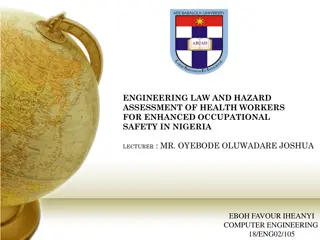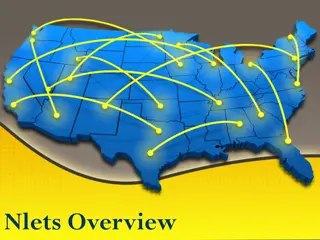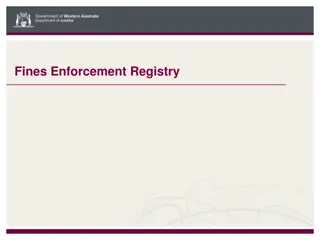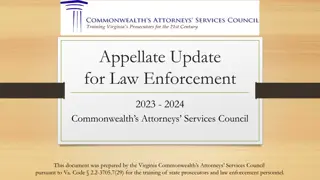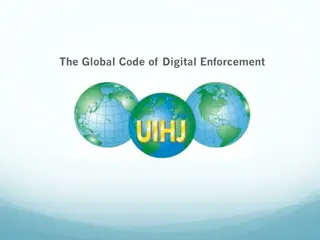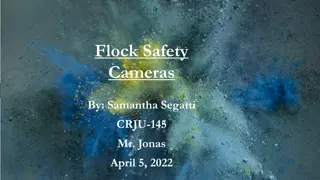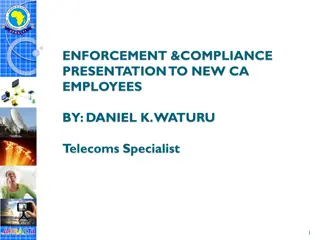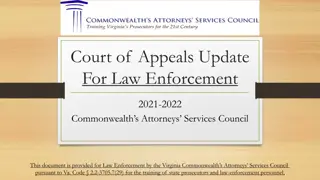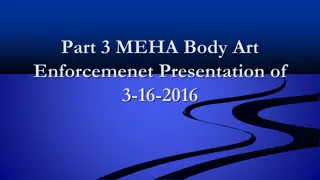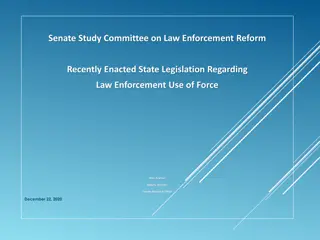Challenges and Future of EU Environmental Law Enforcement
Challenges in enforcing EU environmental law include flawed transposition by Member States, insufficient application, and lack of resources. The implementation deficit hampers effective enforcement, requiring better legislative mechanisms. Transposition of directives is crucial but complex due to varying legal systems. The underlying factors for poor implementation include inadequate administrative capacity, lack of data, and insufficient sanctions. The future of EU environmental law enforcement depends on addressing these issues.
- EU environmental law
- enforcement challenges
- transposition directives
- implementation deficit
- future outlook
Download Presentation

Please find below an Image/Link to download the presentation.
The content on the website is provided AS IS for your information and personal use only. It may not be sold, licensed, or shared on other websites without obtaining consent from the author. Download presentation by click this link. If you encounter any issues during the download, it is possible that the publisher has removed the file from their server.
E N D
Presentation Transcript
WHAT IS THE FUTURE FOR THE ENFORCEMENT OF EU ENVIRONMENTAL LAW ? Tom Flynn Barrister At-Law
Introduction Effective enforcement of EU environmental law is a persistent problem Problem is complex and exists at both community and domestic level Objective is to highlight some problems and attempt to assess the future for Environmental Law the enforcement of EU
the most tenacious problem is not the absence of adequate laws, but the flawed and belated Member State transposition (of directives) as well as insufficient application and enforcement of those rules Key Issue ! Wenneras P. The Enforcement of EC Environment Law (OUP 2007 1-2
The implementation deficit in EU environmental law is a persistent and acknowledged problem Acknowledged by EU itself particularly the Commission Part of the problem lies with the legal and administrative structures of the EU which hinder effective enforcement Does Commission have necessary resources ? Mind the Gap ! Commission has no independent fact-finding powers a severe limitation Are legislative mechanisms sufficient ? Art 258 TFEU procedure is it effective ? Are remedies under 260 TFEU effective should they be more robust ?
Transposition of EU Environmental Directives is the key problem Problem is not just non or late transposition but also ensuring effective transposition The Process of Transposition This is difficult because in many cases it requires a deep understanding of a Member States legal system and its interaction with the Directive in question It requires an assessment of the impact and effectiveness of domestic legislation over time
The problem of transposition EC Commission Instigated a process of Regular Reviews of Environmental Implementation EC Commission Survey of National Enforcement authorities identified common underlying factors resulting in poor implementation Main Reason insufficient administrative capacity followed by insufficient data, evidence information and a deficit of skills Other reasons insufficient sanctions and inadequate integration of environment concerns into policies programmes and projects
Obvious give the Commission more resources and powers to ensure/redress non- transposition Develop further the doctrine of direct effect expand the circumstances whereby individuals can directly invoke EU Directives in domestic law Solutions to the problem of non- transposition Develop/Expand the doctrine of indirect effect especially interpretive obligations In large measure these solutions lie in the hands of the Courts especially the CFI and CJEU
WRC has the authority to disapply or ignore a rule of national law that is contrary to EU law. WRC established to give effect to EU law WRC, is required of its own motion, to disapply or disregard any provision of national legislation where it is contrary to EU law. Case C-378/17 WRC v AGSC The CJEU also clarified that the WRC do not need to request or await the contrary provisions of national law to be set aside. Importantly, judgment that it has repeatedly held that the duty to disapply or disregard national legislation that is contrary to EU law is owed by all organs of the State, including administrative authorities. the CJEU noted in its
This clarifies that the power to disapply or disregard national law if it conflicts with EU law is not confined to courts of law. decision is noteworthy as it It potentially extends those powers to all national bodies and administrative authorities in EU member states which are tasked with applying EU law. Case C-378/17 WRC v AGSC Obvious context and has possibility to address the problems of transpositions of EU environmental law impact in environmental However such bodies must be aware of their obligations under EU law
Record of Enforcement/Transposition of EU Environmental Law is mediocre Reasons include legislative inertia and indifference The Domestic The Domestic Context Context Lack of resources is clearly a difficulty Excessive reliance on secondary legislation is a particular problem Such legislation is very frequently poorly drafted and on occasion inadequate
Friends of the Irish Environment v Minister for Communication Climate Action and Environment & others [2019] IEHC 646 Simons J In summary - a challenge to the manner in which large-scale peat extraction is regulated under Irish law specifically provisions exempting peat extraction that involves an area of greater than 30 hectares from the requirement to obtain planning permission (instead, subject to licensing by the EPA)) Transposition by secondary legislation Law contained in secondary legislation: (i) the EU (Environmental Impact Assessment) (Peat Extraction) Regulations 2019 (S.I. No. 4 of 2019), and (ii) the Planning and Development Act 2000 (Exempted Development) Regulations 2019 (S.I. No. 12 of 2019).
SI.4 of 2019 made pursuant to section 3 of the European Communities Act 1972 & purported to amend EPA Act 1992 & PDA 2000 Applicant contends regulations in breach of EIA & Habitats Directive (upheld) Also argued that the Ministerial Regulations are ultra vires on the grounds that they trespass upon the exclusive legislative function of the Oireachtas (Article 15.2 of Constitution) ultra vires the European Communities Act 1972, Friends of the Irish Friends of the Irish Environment v Minister for Environment v Minister for Communication Climate Communication Climate Action and Environment & Action and Environment & others others State respondents primary legislation are necessitated by EU law, or, in the alternative, that the effective enforcement of EU law is incidental, supplementary or consequential to the obligations arising from the EIA Directive and Habitats Directive with scope of EC Act 1972
The precise mechanism by which transposition of achieved is via Communities Act 1972 (as amended). It authorises the use of secondary legislation to give legislation, including Directives. Section 2 provides that acts adopted by the institutions of the Europe an Union institutions of what was formerly the European Communities) shall be part of the domestic law of the State under the conditions laid treaties governing Union. EU legislation the is European Friends of the Irish Friends of the Irish Environment v Environment v Minister for Minister for Communication Communication Climate Action Climate Action and Environment and Environment effect to EU European (and by the down the in the & others & others European
Supreme Court in Meagher v. Minister for Agriculture [1994] 1 I.R.329 held that these powers are constitutional by reference to what was then Article 29.4.5 of the Constitution of Ireland. In Maher v. Minister for Agriculture[2001] IESC 32, [2001] 2 I.R. 139, the Supreme Court reiterated that there are limits to the entitlement to make regulations under the European Communities particular, if regulations went than simply implementing details of principles or policies to be found in a European Directive or Regulation, and instead determined such principles or policies, then such regulations would be ultra vires Friends of the Irish Friends of the Irish Environment v Minister for Environment v Minister for Communication Climate Communication Climate Action and Environment & Action and Environment & others others Act 1972. further In
Simons J. The application of this test entails identifying the extent of the policy choices, if any, left over to the Member States under the relevant EU legislation. If there are significant policy decisions to be made by the Member States, then it will not be permissible, as a matter of constitutional law, to rely on secondary legislation. Conversely, if the discretion to be exercised is so constrained by principles and policies set out in the EU legislation as to leave no real choice to a Member State, then the use of secondary legislation will be legitimate Friends of the Irish Friends of the Irish Environment v Minister for Environment v Minister for Communication Climate Communication Climate Action and Environment & Action and Environment & others others the discretion afforded to the Member States to provide under EIA/Habitats Directive for a regularisation procedure is limited, and that the Ministerial Regulations discretion. It follows that the Ministerial Regulations are inconsistent with the EIA Directive and the Habitats Directive exceed that
Friends of the Friends of the Irish Irish Environment Environment v Minister for v Minister for Communicati Communicati on Climate on Climate Action and Action and Environment Environment & others & others Simons J. If this conclusion is correct, then the making of the Ministerial Regulations is ultra vires the European Communities Act 1972. Secondary legislation which is inconsistent with EU legislation cannot be said to give effect to the principles and policies contained in the EU legislation. Nor can it be said to be incidental, supplementary and consequential to the EU legislation or necessitated by the Irish State s membership of the European Union. Rather, it is contrary to EU law.
During the course of argument before me, much energy was expended in arguing that the Ministerial Regulations contain measures which were within the range of choices open to the Member States under the two EU Directives. Whereas this is directly relevant to the question of whether the Ministerial Regulations are consistent with EU law, it is not the correct legal test for the purposes of the Article 15.2 argument. It is a sine qua non to the exercise of the power to make regulations under the European Communities Act 1972 that the regulations are consistent with EU law. A set of regulations which are consistent with EU law may nevertheless be invalid as a matter of national constitutional law precisely because they take the form of secondary rather than primary legislation. Put otherwise, EU law is concerned with the content of the measure. Provided that the content is consistent with EU law, it is largely a matter of indifference to the EU legal order as to whether same has been introduced by way of primary or by way of secondary legislation. For the purposes of Article15.2 of the Constitution of Ireland, however, that distinction is crucial Friends of the Irish Friends of the Irish Environment v Environment v Minister for Minister for Communication Communication Climate Action Climate Action and Environment and Environment & others & others The regulations made broad policy choices and trespassed on role of Oireachtas Article15.2 of the Constitution Does not mean secondary legislation can never be employed to transpose EU environmental legislation but This can only be determined by considering the extent of the discretion left over to the Member States in each instance
Simons J For the reasons set out in detail earlier in this judgment, I have concluded that the discretion afforded to the Member States to provide for a regularisation procedure is limited, and that the Ministerial Regulations exceed that discretion. It follows that the Ministerial Regulations are inconsistent with the EIA Directive and the Habitats Directive. If this conclusion is correct, then the making of the Ministerial Regulations is ultra vires the European Communities Act 1972. Secondary legislation inconsistent with EU legislation cannot be said to give effect to the principles and policies contained in the EU legislation. Nor can it be said supplementary and consequential to the EU legislation or necessitated by the Irish State s membership of the European Union. Rather,it is contrary to EU law. Friends of the Irish Environment v Friends of the Irish Environment v Minister for Communication Minister for Communication Climate Action and Environment & Climate Action and Environment & others others which is to be incidental,
Case illustrates the complexities and difficulties of transposing EU Environmental Law via secondary legislation Underscores that there are limits to this procedure Friends of the Irish Friends of the Irish Environment v Environment v Minister for Minister for Communication Communication Climate Action and Climate Action and Environment & others Environment & others If secondary legislation is contrary to EU law it is in invalid and the use of such legislation transpose EU law will thus be unlawful Even if secondary legislation is consistent with EU law the use of secondary legislation to transpose may in certain circumstances be unlawful
Irish courts have a key role in ensuring effective transposition of EU environmental law In the past Irish courts have been criticised for their alleged failure to robustly apply EU environmental law in a domestic context Role of the Irish Courts Criticism may have been well founded in the past but more recent case-law suggests it is unjustified Recent increase in preliminary references to the CJEU also support view
Growing awareness of environmental issues especially amongst younger generation driven by climate change issues Active ENGO community which is effectively utilising domestic law to secure compliance with EU Environmental Law Reasons to be cheerful ! Assisted by the special costs rules contained in s.50B of the PDA 2000 & s.3 of the EMPA 2o11 Aarhus Convention is a critical dynamic and will remain so
Whilst there is some basis for optimism there in no room for complacency Problem of non-enforcement at EU level is persistent and requires political will to resolve which is not readily apparent A similar position applies at domestic level Conclusions Proposals to amend JR rules to impose onerous time-limits and restrict standing illustrate the difficulties Brexit !





